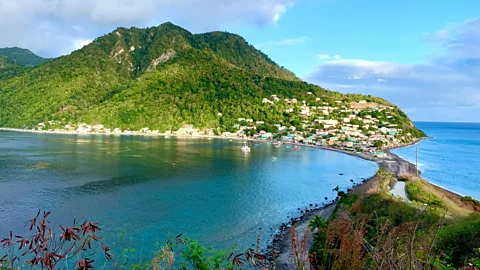Photo credit: BBC
A Caribbean nation plans to become the world’s most resilient climate-resilient island without accruing massive debt or waiting for promised aid from wealthier countries.
NDTV WORLD reports that Domonica, in a bid to rebuild and thrive after Hurricane Maria’s devastation seven years ago, has turned to an unconventional source—selling passports. By offering citizenship to affluent people, often from China and the Middle East, for hundreds of thousands of dollars, the island has found a way to fund its recovery efforts.
Its citizenship program began in the 1990s. However, it has rapidly expanded since the hurricane and has become the primary source of national revenue. Funds raised are directed towards infrastructure projects, including new medical clinics and residential complexes for those displaced by the storm.
A former minister, Francine Baron, called the initiative a “savior”.
The finance minister, Irving McIntyre, said, “The program means a lot to us. We realized we had to get a self-dependent form of financing to deal with climate change.”
However, the program has raised eyebrows over transparency and security concerns. Although the price for citizenship has increased to $200,000, it remains one of the most affordable options globally. Some recipients reside in Dominica, a small island with a population of 71,000, known for its lush landscapes.
Hurricane Maria severely damaged the economy. Losses were estimated at over double the country’s gross domestic product. Prime Minister Roosevelt Skerrit has vowed to rebuild better and more resiliently, emphasizing the urgent need for funding to mitigate future climate risks.
Officials claim that climate change, primarily driven by emissions from wealthier nations, is resulting in more frequent and severe hurricanes. The nation’s proactive stance on climate resilience includes substantial investments in housing and infrastructure. The government claims to have funded around 2,000 homes in locations designed to withstand future disasters. It aims to invest in resilient infrastructure to mitigate climate risks while seeking support from developed nations amid a funding shortfall highlighted by the UN in global climate discussions.
The passport sale approach has sparked controversy about the potential risks of granting citizenship to individuals with unclear backgrounds. Critics argue that such programs may not be adequately scrutinized. The EU and other international bodies have raised alarms regarding security measures.
However, the demand for Dominican passports remains robust. The island has become a hub for those seeking greater mobility and access through alternative citizenship.







